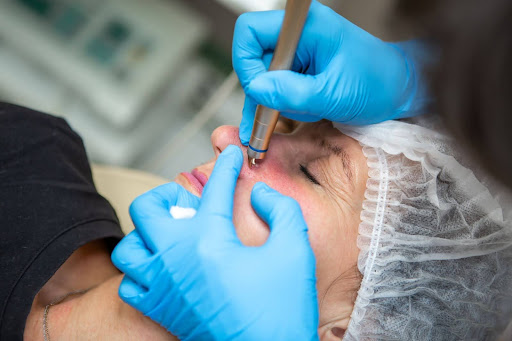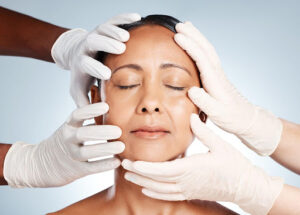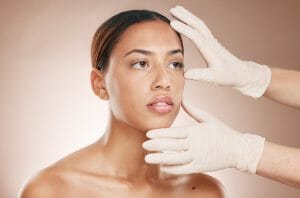Rosacea is a common, chronic skin condition that causes persistent redness, visible blood vessels, and frequent flare-ups. Many sufferers wonder how to get rid of rosacea permanently. While there isn’t a definitive cure, laser treatments and other rosacea treatments can significantly reduce symptoms and improve skin health. In this article, we share effective strategies, including personalized treatment plans and advanced therapies to help you manage and reduce rosacea for lasting relief.
What is Rosacea?
Rosacea is an inflammatory skin condition that primarily affects the central part of the face, including the cheeks, nose, chin, and forehead. Common symptoms include persistent redness, visible blood vessels, inflamed bumps, and occasionally eye irritation known as ocular rosacea. This condition can affect anyone but is most prevalent in fair-skinned individuals, often leading to embarrassment or self-consciousness.
Types of Rosacea
There are different types of rosacea, each with its own set of symptoms:
- Erythematotelangiectatic Rosacea: Characterized by persistent redness and visible blood vessels.
- Papulopustular Rosacea: Involves the formation of red, irritated bumps and pustules on the face.
- Phymatous Rosacea: Leads to thickened skin and uneven texture, often affecting the nose.
- Ocular Rosacea: Causes inflammation in the eyes, leading to redness, dryness, and irritation.
What is the Cause of Rosacea?
Rosacea is a chronic skin disease caused by a combination of genetic, environmental, and immune system factors that trigger inflammation in the skin. It often results in persistent redness, visible blood vessels, and a bumpy skin texture, particularly on the face. Many rosacea patients also experience dry skin, which can exacerbate symptoms and cause discomfort.
In severe cases, the condition may lead to thickened skin and flare-ups that significantly impact quality of life. While there is no cure for rosacea, proper treatment, such as topical or oral medications, lifestyle changes, and skincare tailored to sensitive skin, can help manage symptoms and improve overall skin health. Addressing rosacea early is crucial to preventing further progression and maintaining a balanced, healthy complexion.
Common Symptoms of Rosacea
- Persistent Redness: Permanent redness on the cheeks, nose, forehead, or chin, often one of the earliest signs of rosacea.
- Enlarged Blood Vessels: Visible small blood vessels under the skin, especially in the central facial area.
- Bumpy Texture: Skin may develop a rough or uneven texture, often accompanied by small red bumps or pimples.
- Itchy Skin: A sensation of itching, burning, or stinging in the affected areas.
- Flushing Episodes: Frequent or prolonged flushing of the skin, triggered by heat, stress, or certain foods.
- Skin Sensitivity: Increased sensitivity to skincare products, sunlight, or environmental factors.
- Eye Irritation: Some patients may experience dry, irritated, or bloodshot eyes, a condition known as ocular rosacea.
If you notice persistent symptoms that worsen over time, it’s important to consult a healthcare professional for proper diagnosis and treatment.
Treatment Options for Rosacea
If you struggle with frequent rosacea flare-ups, finding the right treatment is essential to managing your symptoms. Since rosacea presents in many forms, effective treatment options are just as diverse. At Clinique Face MD, our specialists take the time to understand your unique skin needs and work with you to identify the best treatment plan to help manage this chronic skin condition and bring you relief.
1. Laser Treatments
Laser therapy is one of the most effective treatments for managing rosacea symptoms. It targets the visible blood vessels and reduces redness by delivering precise pulses of light to the affected areas. The heat from the laser coagulates the blood vessels, causing them to shrink over time.
- Pulsed-dye laser (PDL): The Vbeam laser is highly effective for treating redness and broken capillaries caused by rosacea. It delivers bursts of laser energy that selectively target blood vessels, coagulating them without damaging surrounding skin. Over multiple sessions, this treatment helps significantly reduce redness and inflammation.
-
Intense Pulsed Light (IPL) Therapy: Also known as light therapy, IPL uses broad-spectrum light to target inflamed skin and visible blood vessels, improving overall skin tone and reducing flare-ups.
Laser treatments work best when combined with gentle skincare routines and avoiding triggers, as this helps minimize flare-ups and maintain clearer skin.
2. Topical Medications
For mild to moderate cases of rosacea, topical treatments are often the first line of defense. These creams and gels work by calming inflammation and targeting the bacteria that contribute to rosacea symptoms.
- Azelaic Acid: A popular topical treatment that reduces inflammation, kills acne-causing bacteria, and evens out skin tone.
- Topical Antimicrobials: Antibiotic creams like metronidazole can be effective for reducing inflammation and controlling breakouts.
- Prescription Topicals: These might include sulfur-based creams, which soothe irritated skin and reduce inflammation.
3. Oral Medications
For more severe cases of rosacea or those that don’t respond to topical treatments, oral medications may be prescribed.
- Oral Antibiotics: Doxycycline is commonly prescribed to treat inflammatory rosacea and prevent flare-ups. It works by reducing bacterial populations in the skin and calming the immune response.
- Anti-inflammatory Medications: Other oral anti-inflammatory drugs may be used depending on the individual’s condition and response to therapy.
4. Natural Remedies
While laser treatments and prescription medications can significantly improve rosacea symptoms, some individuals find relief through natural remedies that complement medical treatment.
- Tea Tree Oil: Known for its anti-inflammatory properties, tea tree oil can help reduce redness and irritation when applied topically in diluted form.
- Witch Hazel: Its gentle astringent properties can reduce inflammation and calm irritated skin.
- Herbal Remedies: Some herbal extracts, like chamomile or calendula, have soothing properties that help reduce skin irritation.
How to Choose the Right Treatment Solution for You
Choosing the right treatment solution for rosacea involves understanding your unique symptoms and needs. As a chronic condition, rosacea requires tailored care, whether through dermal therapies, topical treatments, or laser therapy. By identifying personal triggers and working with a professional, people with rosacea can find effective solutions to manage this common skin condition.
Understand Your Symptoms
Take the time to closely monitor your specific rosacea symptoms, such as persistent redness, dry patches, or frequent flare-ups. Identifying these signs is key to selecting the most effective treatment, whether it involves topical creams, oral medications, or laser therapy. Since each symptom may respond differently to treatment, understanding your unique skin condition is crucial for finding the best solution tailored to your needs.
Consider Your Skin Type
People with fair skin are more prone to rosacea, making it important to carefully choose treatments that won’t exacerbate symptoms. Fair skin is more sensitive, so treatments like harsh exfoliants or strong topical medications can lead to irritation. Opt for gentle creams or facials and light-based therapies that are specifically formulated for sensitive skin to avoid further damage and maintain skin health.
Personalize Your Approach
Rosacea affects everyone differently, with triggers ranging from stress and sun exposure to spicy foods and cold weather. Since a one-size-fits-all approach isn’t effective, creating a personalized treatment plan tailored to your unique needs is essential. This involves identifying and avoiding your specific triggers while focusing on strategies that work best for your skin. Understanding your personal triggers allows you to develop a sustainable and effective routine to better manage flare-ups and maintain healthy skin.
Assess Your Long-Term Goals
Before selecting a treatment, consider your long-term objectives. Are you aiming to reduce severe symptoms, minimize redness, or improve your overall quality of life? While options like laser therapy may provide quick relief, you may also need long-term strategies to control flare-ups and prevent future symptoms. Aligning your treatment plan with your goals will ensure lasting results and healthier skin over time.
Create a personalized treatment plan at Clinique Face MD
Can Rosacea be Permanently Cured?
Rosacea is a chronic skin condition without a permanent cure, but it can be effectively managed with the right treatment approach. Symptoms such as redness, flare-ups, and irritation can be controlled using topical creams, oral medications, laser therapy, and lifestyle adjustments.
Identifying common triggers like sun exposure, spicy foods, hot beverages, and stress is essential for creating a personalized treatment plan. By addressing these triggers and tailoring care to your needs, individuals with rosacea can achieve long-term relief and improved skin health.
Skincare Tips to Manage Rosacea
In addition to medical treatments, maintaining a gentle skincare routine is vital for managing rosacea:
- Use Gentle Cleansers: Choose products specifically formulated for sensitive skin that don’t strip the skin of moisture.
- Moisturize Regularly: Hydrating the skin helps prevent dryness and irritation, which can worsen rosacea symptoms.
- Avoid Harsh Exfoliants: Exfoliating products that are too abrasive can lead to skin irritation and worsen flare-ups.
- Wear Sunscreen Daily: Shielding your skin from UV rays with a broad-spectrum SPF 30 or higher helps prevent sun-induced flare-ups.
Book a Laser Therapy Session for Rosacea Treatment
At Clinique Face MD, we provide advanced medispa and cosmetic services designed to help individuals achieve their best skin. With a focus on personalized care, our experienced team offers a range of treatments tailored to address concerns like rosacea, skin redness, and fluctuating skin conditions. From cutting-edge laser therapies to gentle dermal treatments, we prioritize your comfort and long-term results, helping you feel confident and radiant in your own skin!





